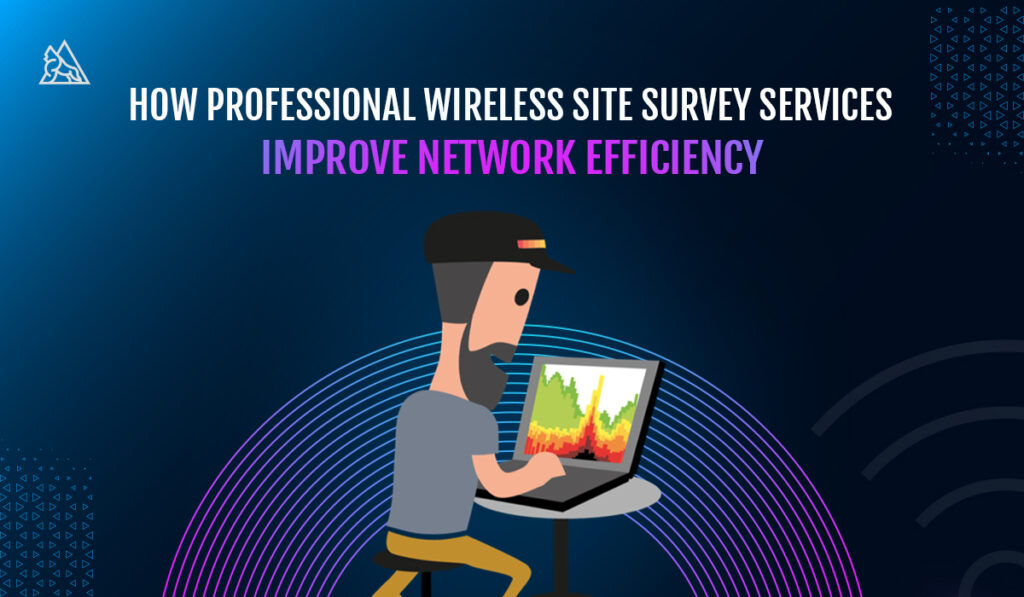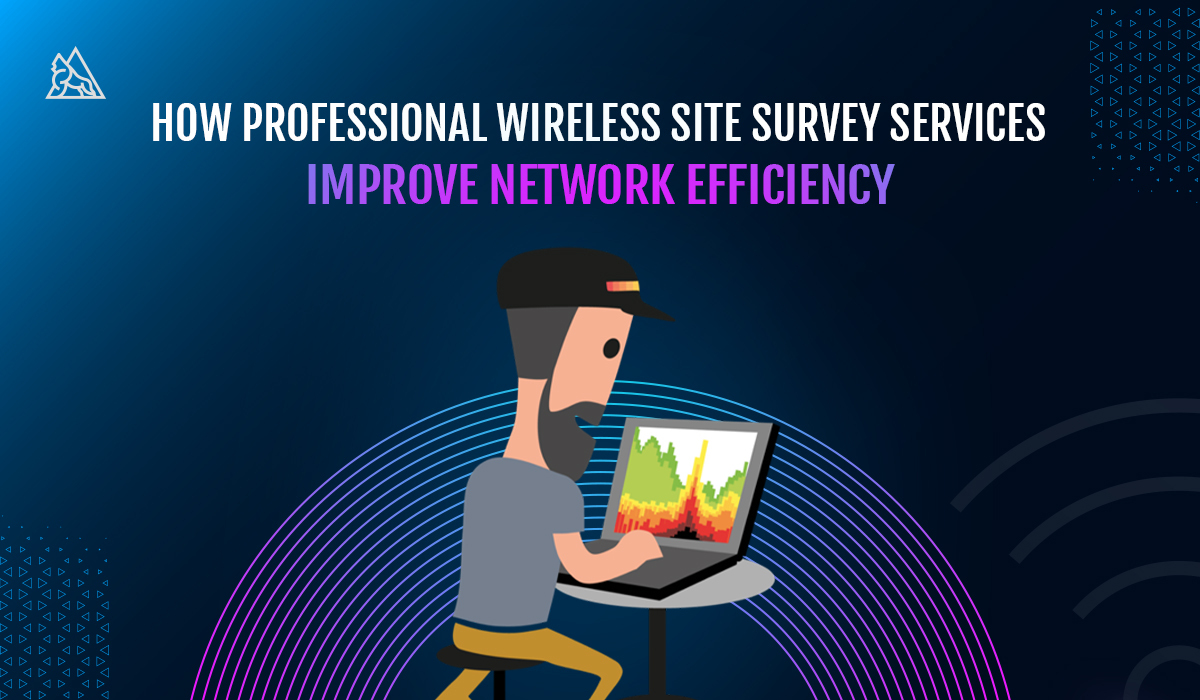The demand for high-performance Wi-Fi infrastructure has skyrocketed as businesses, institutions, and even homes rely on seamless internet connectivity for daily operations. Yet, many organizations struggle with network inefficiencies that lead to poor performance, slow speeds, frequent dropouts, and even security vulnerabilities. According to a Cisco report, 90% of IT leaders claim poor Wi-Fi directly impacts productivity, while Gartner states that 67% of businesses face network challenges due to improper planning and deployment.
This is where wireless site survey services come into play. A wireless site survey is an essential diagnostic and planning tool used to assess Wi-Fi performance, identify network weak points, and optimize Wi-Fi infrastructure for maximum efficiency.
By working with wireless site survey companies, businesses can address a variety of challenges, including:
- Identifying dead zones where signals drop.
- Reducing interference from competing networks and electronic devices.
- Ensuring proper bandwidth allocation for high-demand areas.
For instance, a major e-commerce warehouse that faced slow data transmission due to Wi-Fi congestion used Ekahau Wi-Fi site survey services to restructure its network. After optimization, scanner efficiency improved by 40%, drastically enhancing logistics operations.
By investing in professional wireless site survey services, businesses can ensure their Wi-Fi networks are not only reliable but also scalable and future-proof, enabling them to support modern connectivity demands efficiently.
Types of Wireless Site Survey Services
Different types of wireless site surveys are tailored to meet the specific needs of businesses based on their infrastructure and operational requirements. The three primary types are:
1. Passive Site Survey
A passive site survey is conducted without actively connecting to the Wi-Fi network. Instead, it monitors radio frequencies to measure signal strength, interference, and coverage gaps. This is ideal for troubleshooting networks that suffer from dead zones or performance inconsistencies.
Example: A corporate office struggling with conference room connectivity used a passive survey to detect interference from neighboring offices. By adjusting their Wi-Fi channels, they eliminated 30% of latency issues.
2. Active Site Survey
An active site survey connects directly to the Wi-Fi network to measure throughput, bandwidth, and actual network performance. This survey is particularly useful when Wi-Fi users experience slow speeds or inconsistent connectivity.
Example: A university deploying Ekahau site survey services discovered that dormitory Wi-Fi was overloaded due to excessive device connections. By redistributing bandwidth, they increased speed efficiency by 50%.
3. Predictive Site Survey
A predictive site survey uses specialized software, such as Ekahau Pro, to simulate Wi-Fi performance before physical deployment. This is critical for new office spaces, warehouses, and retail stores that need a robust network design before installation.
| Survey Type | Best Use Case | Tools Used |
| Passive | Diagnosing weak signals and interference. | Ekahau Wi-Fi Site Survey Services, AirMagnet. |
| Active | Measuring network speed and reliability. | NetSpot, Ekahau Site Survey Services. |
| Predictive | Designing a new network before installation. | Ekahau Pro, AirMagnet Planner. |
By selecting the right wireless site survey service, businesses can tailor their network optimization strategy for long-term efficiency.
The Impact of Wireless Site Survey Services on Wi-Fi Infrastructure
A well-executed wireless site survey has a significant impact on the efficiency, performance, and security of a Wi-Fi network. Companies that invest in Wi-Fi site survey services experience tangible benefits in terms of speed, reliability, and coverage optimization.
Optimizing Wi-Fi Performance
Wireless site surveys help businesses eliminate weak signal areas, improve bandwidth allocation, and ensure seamless connectivity across their premises.
| Before Wireless Site Survey | After Wireless Site Survey |
| Wi-Fi dropouts in office spaces. | Strong and consistent coverage. |
| Slow speeds due to congestion. | Optimized bandwidth allocation. |
| Poorly placed APs causing interference. | Strategic AP placement for efficiency. |
For example, a large medical center suffering from Wi-Fi dead zones used an Ekahau Wi-Fi site survey service to identify weak signals and strategically place APs near patient rooms, ensuring uninterrupted medical equipment connectivity.
Eliminating Interference and Congestion
Wireless site surveys help businesses detect interference caused by Bluetooth devices, neighboring Wi-Fi networks, and physical obstacles.
| Common Interference Sources | Impact on Wi-Fi | Solution |
| Microwave ovens | Signal degradation | Use 5GHz channels. |
| Concrete walls | Blocked signals | Increase AP density. |
| Overlapping Wi-Fi networks | Slow speeds | Adjust channel selection. |
By addressing interference sources, businesses can increase Wi-Fi performance by up to 50%.
Strengthening Wi-Fi Security
A wireless site survey detects rogue APs, unauthorized users, and outdated encryption protocols, ensuring network security.
A law firm discovered unauthorized devices accessing their Wi-Fi during a security-focused wireless site survey. By upgrading to WPA3 encryption and enabling network monitoring, they prevented data breaches and security risks.
Choosing the Right Wireless Site Survey Company
Selecting a reliable wireless site survey company ensures that businesses receive accurate analysis, expert recommendations, and long-term network stability.
| Factor | Why It Matters |
| Experience in enterprise networking | Ensures scalable Wi-Fi solutions. |
| Use of advanced tools | Ensures accurate heatmaps and interference analysis. |
| Client testimonials and case studies | Demonstrates past success. |
| Ongoing support and monitoring | Keeps Wi-Fi infrastructure future-proof. |
For example, a hotel chain used Ekahau site survey services to redesign its guest Wi-Fi network. The survey helped them improve network performance, leading to a 25% increase in positive guest reviews related to Wi-Fi quality.
Conclusion: Why Wireless Site Surveys Are Essential for Modern Businesses
Investing in wireless site survey services ensures optimal Wi-Fi performance, reduced downtime, enhanced security, and seamless scalability. With tools like Ekahau Wi-Fi site survey services, businesses can maximize their network efficiency while minimizing operational disruptions.
For any business relying on Wi-Fi for daily operations, working with professional wireless site survey companies is no longer an option—it’s a necessity. By optimizing Wi-Fi infrastructure, businesses can boost productivity, enhance customer experience, and ensure seamless digital connectivity in an ever-evolving landscape.
Frequently Asked Questions (FAQs)
What is a wireless site survey, and why is it necessary?
A wireless site survey is a comprehensive assessment of a Wi-Fi network’s performance, coverage, and interference. It helps identify dead zones, congestion issues, and security vulnerabilities, allowing businesses to optimize their Wi-Fi infrastructure for better efficiency.
For example, retail stores use wireless site survey services to improve their customer-facing Wi-Fi networks, ensuring seamless online shopping and in-store navigation.
How do wireless site survey services improve Wi-Fi performance?
Wireless site survey services analyze network parameters such as signal strength, bandwidth allocation, and interference sources. By strategically placing access points (APs) and optimizing channel selection, businesses can experience faster speeds, reduced latency, and fewer dropouts.
According to Cisco, proper Wi-Fi optimization can increase network speed by up to 60% and enhance overall productivity.
How often should businesses conduct a wireless site survey?
It’s recommended to perform a wireless site survey:
- Before a new Wi-Fi deployment to ensure optimal AP placement.
- Annually, as network demands change and new interference sources emerge.
- After major renovations or expansions to adjust Wi-Fi coverage.
- If users report slow speeds, dropouts, or inconsistent connectivity.
For example, large warehouses conduct site surveys every 6-12 months to adjust Wi-Fi coverage for new storage layouts and automation systems.
Can businesses perform their own wireless site surveys?
While businesses can use DIY tools like NetSpot or Wi-Fi Analyzer, professional wireless site survey companies offer more precise data and expert recommendations.For complex environments (warehouses, hospitals, airports), working with professionals using Ekahau site survey services is the best option for long-term efficiency.










